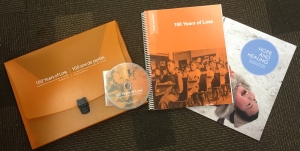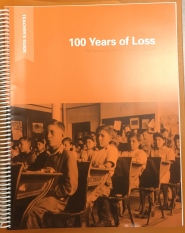The end is near. The end is literally tomorrow. WE DID IT. Reflecting  back to the start of September, I had no idea what I was in for. I think one of the reasons why internship is so hard to explain to other people or to other pre-service teachers about the expe
back to the start of September, I had no idea what I was in for. I think one of the reasons why internship is so hard to explain to other people or to other pre-service teachers about the expe
rience is because every teacher is so incredibly different and every internship experience is unique. There are about 17-20 other interns at my school and I guarantee we have all had extremely different experiences.
I survived my three-week block, which is where I was teaching four classes a day. Teaching full time is exhausting. People really don’t understand the extent of work each teacher does every single day and night; the work definitely doesn’t stop at 3:30. There hasn’t been a time in the last month that I have been able to leave school and have a night completely to myself. There is always something that needs to be marked, a worksheet to be planned, or some type of prep to do. Although to be fair, I am a very inexperienced teacher who needs a lot of extra time planning, but I don’t know a teacher who doesn’t work hard inside and outside of their job.
I have taught English in grades 10, 11 and 12. I love it – except for the marking aspect. I am really enjoying my grade 11 and 12s; the students are so fun. A lot of people a
ssume that the senior grades would be tougher, but I like it a lot more than I thought I would. It is solely because of the students, I was so fortunate to have been paired with the students I have been with the past few months. The grade 12 students were so excited for me to start teaching their class which was a nice feeling. I think one of the reasons I enjoy teaching them the most is because they are (usually) more mature. They enjoy having in-depth conversations about current events, controversies, and politics and then relating all of those things to the stories or themes we were studying. The grade 11s were the grade I was most nervous to teach because there are so many of them (31) but surprisingly, they were one of my favorite classes, although it was a period one class and a lot of them are still a bit sleepy-eyed that early in the morning.
My grade 10 students were great too, but a lot tougher than I had originally expected. It is a really tough age to connect with. I have had them for the entire year, and we currently just wrapped up our study of Macbeth. I have found teaching Shakespeare to be very challenging. Some of my students were very resistant to it simply because it is Shakespeare. They told me from the beginning that they think it is stupid to learn because they won’t even need it in “real life” and so they totally tuned out. I felt very defeated at times because I was trying to the best of my abilities to get them engaged with Shakespeare. We go through it as a class and then review each scene, usually a brief summary unless a further analysis is needed. We aren’t reading through the entire play, picking and choosing an important aspect that contributes to their comprehension. I am trying to let them know that it is not the language that they need to learn how to read, it is the decoding and analyzing new things. It is the higher level of thinking that I want them to get out of it, not just what the plot is. Reflecting on it now, I don’t think I would necessarily study Shakespeare that in depth through only reading. Shakespearean plays are to be acted out and viewed, so reading each scene in depth wasn’t as useful as I had hoped it would be. Although I have been extremely frustrated with them at times, I will definitely miss all of their lively personalities and I am thankful they allowed me into their classroom so easily.
I have found the hardest part of teaching is the marking, not only the copious amounts but also the deciding factor of grading student work. I have found it very challenging to decide what grade they should get and justifying it. In the study of English especially, a lot of the work is subjective so having a clear idea of what YOU as the teacher want is very important, while maintaining the expectations of the curriculum. I felt a lot of pressure with marking in the higher levels, because this has a direct effect on that student’s future. While marking some of the grade twelve works, I felt a lot of pressure to give fair marks that clearly reflect the standard of work they have submitted and I took marking very seriously. This is another part of internship that is very challenging because I am trying to mark my judgment and marking to another teacher whom has different standards so I am always second guessing myself.
One thing I have noticed that I need to work on is my confrontational skills. I am not a huge fan of confrontation but as I have said before, my students were all so great that I didn’t get a lot of experience with discipline, which is something I regret. However, throughout internship I do realize how important classroom expectations and outlining behavior and routines at the beginning of the year, and this is a practice I strongly agree with and will continue to follow.
I have been teaching in the FIAP room as well, and I have been enjoying it a lot. The atmosphere is completely different than a senior English class, and it is honestly just a lot fun. It is very challenging work in different ways from a mainstream classroom because each student has such diverse needs and is at completely different stages so it is really hard to plan for. Being as organized and structured as I am, it threw me for a loop at first because it is very “go with the flow” type of thing, where whatever happens, happens. The period that I have been teaching is called “Personal Management” where they are learning life skills that they will (hopefully) utilize to become independent. It is a senior FIAP class so we have ages 18-22 and it is really awesome to see what a great group of students they are. One strategy my coop uses is to assign roles for students who are finished their task to help others who need it; it works out really well because each student is at such different stages that it combats the issue of planning for each different ability l
evel. I have learned so much being in the classroom with them and I really enjoy it. Even though inclusive education in my minor and have taken tons of classes relating to it in university, I have never once been told or shown how to actually TEACH a class so observing and being able to teach a class was an amazing learning experience.
Tomorrow is my last day, and it is a very bittersweet feeling. I am so incredibly excited to be done and be able to relax for a few weeks, but I am going to miss the students so much. As much as I get frustrated with them, you get so attached to them. Students are starting to ask when I will be back to visit, another student said yesterday, “You were the best intern ever Ms. T. Usually interns are always really bad but you were the best one ever.” Of course he was probably just saying that because his group hadn’t presented their final project yet, but it is still nice to hear, regardless!
Teaching is one of the most challenging and utterly exhausting jobs I have ever done. I highly respect all teachers; the reason why they do this demanding job for such little recognition is definitely because of the students. Being able to work with young people everyday is exhausting, but also an incredible feeling. I haven’t worked
with a teacher who isn’t enormously caring, and isn’t willing to go above and beyond for each student. As challenging as these past few months have been, it has been able to show me a clear picture of what a teacher career entails. Many people are asking what my plans now. First, I am going to sleep, and then sleep some more, and then I guess I will finish my degree, as I am technically not a teacher yet. Right now I am so looking forward to spending the next few weeks relaxing and spending the holidays with family and friends, without marking any more essays.
To my fellow interns, congratulations! We survived and I appreciate all of
the enormous support I received from you. I wouldn’t have been able to get through without all of you wonderful people sharing your own experiences and resources. I am looking forward to seeing you all in January!

 I officially reached the halfway point in internship! There are about 38 teaching days left, give or take. Yes, I am very relieved that I am halfway through and still sane and relatively stress-free. On the other hand, this is scary because I am most definitely NOT halfway through my material for my classes. I have already cut out at least 3 assignments and so many m
I officially reached the halfway point in internship! There are about 38 teaching days left, give or take. Yes, I am very relieved that I am halfway through and still sane and relatively stress-free. On the other hand, this is scary because I am most definitely NOT halfway through my material for my classes. I have already cut out at least 3 assignments and so many m Marking. As much as I love literature and wouldn’t want to teach any other subject, I am already overwhelmed with the thought of the immense amount of marking in an English classroom. The amount of time spent on marking papers is amazing. My coop has spent at LEAST 8 hours every Saturday for the past few weeks marking papers. Not to mention the fact that it not only is time consuming, but it is extremely meticulous. There are no right or wrong answers (for the most part). Marking my first few papers was very overwhelming. The ones that I would consider to be garbage (sorry kids!), my coop would go over it with me explaining why they could get a 10/10 in regard to their content, but a 0/10 on their mechanics or something along those lines. You really have to dig deep and look around for what is in there, and analyze their work comparing it to the rubric in order to come up with a grade.
Marking. As much as I love literature and wouldn’t want to teach any other subject, I am already overwhelmed with the thought of the immense amount of marking in an English classroom. The amount of time spent on marking papers is amazing. My coop has spent at LEAST 8 hours every Saturday for the past few weeks marking papers. Not to mention the fact that it not only is time consuming, but it is extremely meticulous. There are no right or wrong answers (for the most part). Marking my first few papers was very overwhelming. The ones that I would consider to be garbage (sorry kids!), my coop would go over it with me explaining why they could get a 10/10 in regard to their content, but a 0/10 on their mechanics or something along those lines. You really have to dig deep and look around for what is in there, and analyze their work comparing it to the rubric in order to come up with a grade. days, right? Last week I took my Monday morning to a new level, as I watched my classroom keys get flushed down the AUTOMATIC flush toilets. I just stood there for a few moments, not really sure what the next step would be. After the initial shock of seeing my precious keys flushed down the toilet wore off, I realized I had to gather up the courage to tell my coop teacher this embarrassing story. Fortunately for me, she was able to find the humor in this, and I was able to get a new set. If this was setting the tone for my week, then it was going to be a long one.
days, right? Last week I took my Monday morning to a new level, as I watched my classroom keys get flushed down the AUTOMATIC flush toilets. I just stood there for a few moments, not really sure what the next step would be. After the initial shock of seeing my precious keys flushed down the toilet wore off, I realized I had to gather up the courage to tell my coop teacher this embarrassing story. Fortunately for me, she was able to find the humor in this, and I was able to get a new set. If this was setting the tone for my week, then it was going to be a long one. It seems as if it was only yesterday that I was sitting in my small high school library, typing out my essay stating why I would be a good candidate to be accepted into the faculty of Education at the University of Regina. Fast-forward three and half years, and here I am (to the left) ready for the first day of school. Only this time I am a teacher instead of the student. The 4th year internship seemed to have come out of nowhere. Am I ready for this internship? No, probably not. I don’t believe anyone can be fully prepared for this big of a challenge. On the first day of classes, a student asked me what my name was and I almost blurted out, “Tessa”. I mumbled something inaudible, trying to recover before responding with Ms. Thacker. I don’t feel like a “Ms.” anything! Even after chopping my hair off in hopes of looking older, I still feel like a student myself.
It seems as if it was only yesterday that I was sitting in my small high school library, typing out my essay stating why I would be a good candidate to be accepted into the faculty of Education at the University of Regina. Fast-forward three and half years, and here I am (to the left) ready for the first day of school. Only this time I am a teacher instead of the student. The 4th year internship seemed to have come out of nowhere. Am I ready for this internship? No, probably not. I don’t believe anyone can be fully prepared for this big of a challenge. On the first day of classes, a student asked me what my name was and I almost blurted out, “Tessa”. I mumbled something inaudible, trying to recover before responding with Ms. Thacker. I don’t feel like a “Ms.” anything! Even after chopping my hair off in hopes of looking older, I still feel like a student myself. I have researched a lot about why it is crucial we as young teachers need to be introducing this education into our classrooms. I have been very encouraged, but also have had moments of extreme discouragement as well. For example, I overheard a fellow pre-intern during our three week block explain how he was teaching a social studies unit to his class, and his cooperating teacher had told him to skip over the part of the Catholic church’s involvement in residential schools. Hearing that I was very shocked, however I was motivated again when my cooperating teacher would make a point of always referencing residential schools and the mistreatment of Ingenious people in Canada’s history.
I have researched a lot about why it is crucial we as young teachers need to be introducing this education into our classrooms. I have been very encouraged, but also have had moments of extreme discouragement as well. For example, I overheard a fellow pre-intern during our three week block explain how he was teaching a social studies unit to his class, and his cooperating teacher had told him to skip over the part of the Catholic church’s involvement in residential schools. Hearing that I was very shocked, however I was motivated again when my cooperating teacher would make a point of always referencing residential schools and the mistreatment of Ingenious people in Canada’s history.


 s curriculum
s curriculum I cannot express how enthused I am with receiving this incredible resource. It is absolutely amazing. It comes in a very organized folder with an information booklet, a teacher’s guide video, and a teacher’s guide filled with information, lesson plans, and activates.
I cannot express how enthused I am with receiving this incredible resource. It is absolutely amazing. It comes in a very organized folder with an information booklet, a teacher’s guide video, and a teacher’s guide filled with information, lesson plans, and activates. ential schools were, the conditions, the healing and reconciliation that is trying to happen, as well as information about what we can do as educators and Canadian citizens.
ential schools were, the conditions, the healing and reconciliation that is trying to happen, as well as information about what we can do as educators and Canadian citizens.

